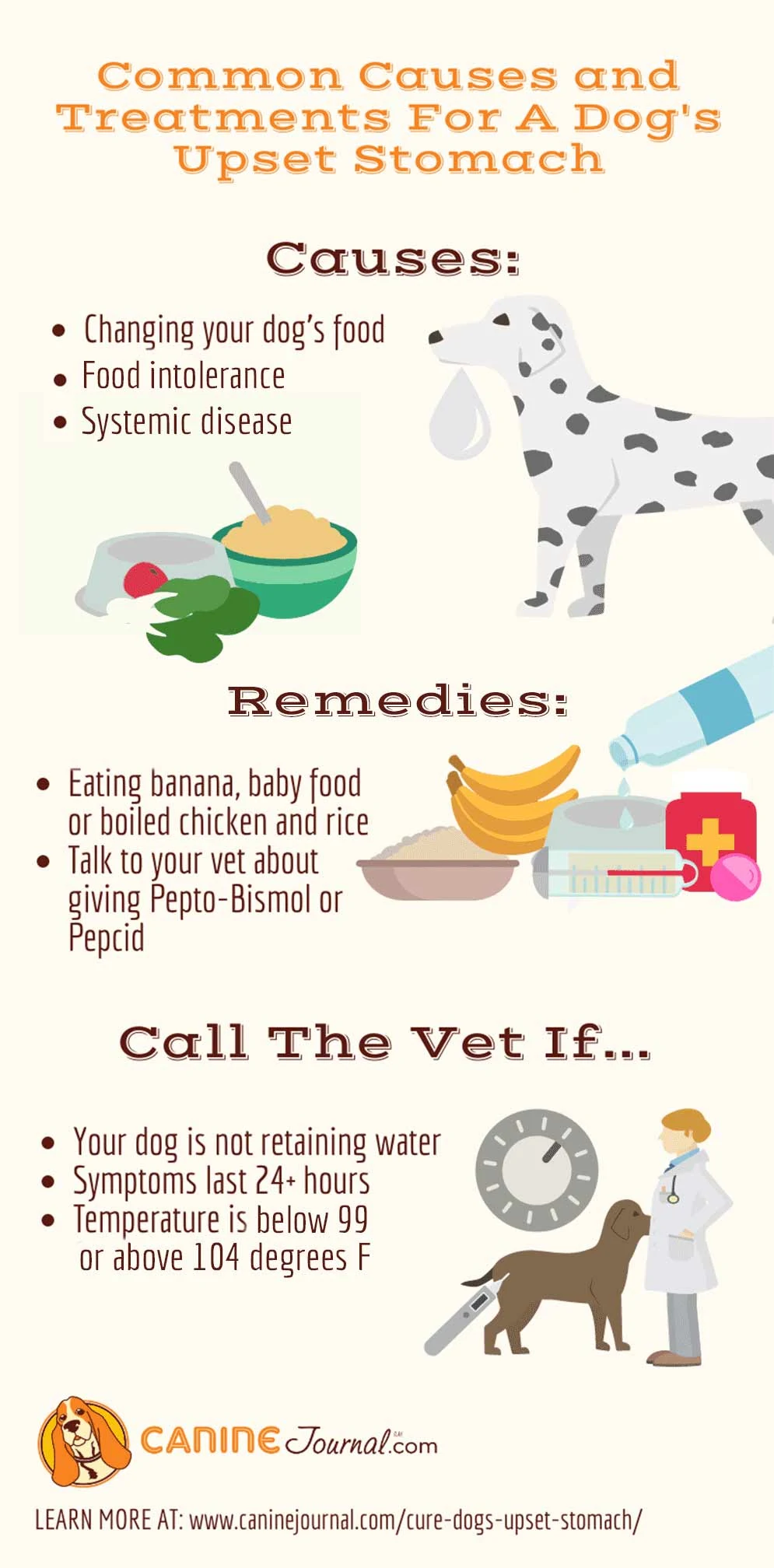Good options for a dog’s upset stomach include boiled chicken and rice, plain yogurt, and canned pumpkin. These can help alleviate symptoms and provide necessary nutrients for recovery.
If your dog is experiencing tummy troubles, it’s important to provide them with the right foods to help soothe their upset stomach. Luckily, there are several options that can help alleviate symptoms and get your furry friend feeling better in no time.
Keep reading as we explore some effective remedies for a dog’s upset stomach, including easily digestible foods and natural remedies that can promote gastrointestinal health. Whether it’s boiled chicken and rice, plain yogurt, or canned pumpkin, we’ll cover various options to aid in your dog’s digestive recovery. By incorporating these simple yet effective remedies into your dog’s diet, you’ll be providing the relief and nourishment they need.
Causes Of An Upset Stomach In Dogs
Upset stomach in dogs can be caused by various factors like dietary changes, eating garbage, or consuming spoiled food. To alleviate this discomfort, feeding your dog a bland diet of boiled chicken and rice, along with probiotics, can help settle their stomach and promote digestion.
When your furry friend is feeling under the weather, it’s important to understand the potential causes of an upset stomach in dogs. Several factors can contribute to this unpleasant condition, including an improper diet, food allergies, and gastrointestinal infections. By knowing what triggers an upset stomach, you can take the necessary steps to alleviate discomfort and promote your dog’s well-being.
2. Improper Diet
Feeding your canine companion a well-balanced diet is crucial for their overall health. However, an improper diet can significantly disrupt their digestive system, leading to an upset stomach. Dogs are primarily carnivores, so their diet should primarily consist of high-quality meat-based protein.
Additionally, avoid feeding your dog table scraps or excessive amounts of fatty foods. These can be difficult for their stomach to digest, potentially causing discomfort and gastrointestinal disturbances. Instead, opt for a nutritionally balanced commercial dog food that meets their specific dietary needs.
3. Food Allergies
Just like humans, dogs can develop sensitivities or allergies to certain foods. These allergies can trigger an upset stomach and other symptoms such as diarrhea, vomiting, and skin irritations. Common allergens for dogs include grains (wheat, corn, and soy), dairy products, and certain proteins.
If you suspect that your dog has a food allergy, it’s important to work with your veterinarian to identify the specific allergen. They may recommend an elimination diet or allergy testing to pinpoint the culprit. Once identified, eliminating the allergen from your dog’s diet can help prevent future episodes of an upset stomach.
4. Gastrointestinal Infections
Gastrointestinal infections, such as viral or bacterial infections, can wreak havoc on your dog’s digestive system. These infections are often caused by consuming contaminated food or water, and can lead to vomiting, diarrhea, and abdominal pain. Proper hygiene and food handling practices are crucial to prevent these infections.
If your dog displays symptoms of a gastrointestinal infection, it’s important to consult your veterinarian for a proper diagnosis and treatment plan. Depending on the severity of the infection, medication and dietary adjustments may be necessary to help your dog recover fully.

Credit: www.caninejournal.com
Signs And Symptoms Of An Upset Stomach In Dogs
Vomiting, diarrhea, and loss of appetite are common signs indicating an upset stomach in dogs. It’s crucial for pet owners to be aware of these symptoms and take appropriate action to alleviate their furry friend’s discomfort. Here’s a closer look at each of these indicators:
Vomiting
Dogs may vomit occasionally due to various factors, but persistent or frequent vomiting could signal an upset stomach. This often indicates the body’s attempt to expel something that’s causing irritation.
Diarrhea
Diarrhea can be a manifestation of digestive upset in dogs. It’s characterized by loose, watery stools and can lead to dehydration if left untreated.
Loss Of Appetite
A loss of appetite is another red flag for an upset stomach in dogs. If your furry companion suddenly shows disinterest in food, it may be an indication of underlying gastrointestinal discomfort.
Home Remedies For An Upset Stomach In Dogs
If your furry friend is suffering from an upset stomach, it can be distressing for both of you. Fortunately, there are several home remedies that can help soothe your dog’s discomfort and aid in their recovery.
Fasting
Fasting your dog for 12 to 24 hours can give their digestive system a chance to rest and recover. Make sure to provide plenty of fresh water during this time to prevent dehydration.
Probiotics
Probiotics can play a crucial role in restoring the balance of good bacteria in your dog’s gut, which is essential for proper digestion and overall well-being. You can find probiotic supplements specifically formulated for dogs at pet stores or consult with your veterinarian for recommendations.
Plain Rice Or Chicken
Feeding plain rice or boiled chicken can be gentle on your dog’s upset stomach. These bland, easily digestible foods can help settle their tummy and provide nourishment without further upsetting their digestive system.

Credit: www.facebook.com
Commercial Products For An Upset Stomach In Dogs
If your furry friend is suffering from an upset stomach, there are several commercial products that can help alleviate their discomfort. From digestive enzymes to prebiotics and fiber supplements, these specialized products are formulated to support and soothe your dog’s digestive system. Let’s explore each of these options to find out how they can benefit your canine companion.
Digestive Enzymes
Digestive enzymes are crucial for breaking down food and aiding in the absorption of nutrients. When your dog experiences an upset stomach, their natural enzyme levels may be out of balance, making digestion difficult. Luckily, there are commercial products available that contain a blend of digestive enzymes. These products can help improve digestion and alleviate symptoms such as vomiting and diarrhea.
Prebiotics And Fiber Supplements
Prebiotics are beneficial for promoting healthy gut bacteria in dogs. These specialized fibers act as food for the good bacteria in your dog’s digestive tract, helping them thrive and maintain a balanced gut environment. Additionally, fiber supplements can help regulate bowel movements and ease constipation or diarrhea.
When choosing a prebiotic or fiber supplement for your pup, look for products that contain natural and easily digestible ingredients, such as pumpkin or psyllium husk. These gentle yet effective solutions can provide relief and support their overall digestive health.
Incorporating these commercial products into your dog’s diet can help calm their upset stomach and restore balance to their digestive system. However, it is always advisable to consult with your veterinarian before introducing any new supplements to your pet’s routine.
When To Consult A Veterinarian
Consult a veterinarian if your dog is experiencing an upset stomach. Professional advice can help determine what is best for your furry friend’s discomfort.
Persistent Symptoms
Persistent symptoms in your dog’s upset stomach can be a cause for concern. If your furry friend is experiencing ongoing digestive issues such as vomiting, diarrhea, or changes in appetite, it is important to seek veterinary advice. These symptoms may indicate an underlying medical condition that requires professional attention. While minor upset stomachs can often be resolved with home remedies, persistent symptoms should be addressed by a veterinarian to ensure your dog’s health and well-being.Signs Of Dehydration
Dehydration can occur in dogs with an upset stomach, especially if vomiting or diarrhea persists. It is essential to monitor your dog’s hydration levels as dehydration can lead to significant health complications. Some signs of dehydration in dogs include excessive panting, dry gums, sunken eyes, and lethargy. If you notice any of these symptoms, it is crucial to consult a veterinarian promptly. They can provide the appropriate treatment and help restore your dog’s fluid balance.Presence Of Blood In Vomit Or Stool
The presence of blood in your dog’s vomit or stool is an alarming sign that should never be overlooked. Blood can indicate more severe underlying issues, such as gastrointestinal bleeding or infections. If you observe blood in your dog’s vomit or stool, it is crucial to consult a veterinarian immediately. They will conduct a thorough examination to determine the cause of the bleeding and provide the necessary treatment. Remember, early intervention is key in addressing these concerns and safeguarding your dog’s health. To summarize, persistent symptoms, signs of dehydration, and the presence of blood in vomit or stool are all serious indicators that should prompt you to consult a veterinarian. Paying attention to these signs and seeking professional advice will ensure your dog receives the necessary care and attention to overcome their upset stomach and maintain optimal health.
Credit: be.chewy.com
Frequently Asked Questions Of What’s Good For A Dog’s Upset Stomach
What Are Common Causes Of A Dog’s Upset Stomach?
One of the common causes of a dog’s upset stomach is dietary indiscretion, where they eat something they shouldn’t have. Other causes include sudden dietary changes, infections, allergies, or underlying medical conditions. Identifying the cause is crucial for proper treatment and prevention in the future.
What Are The Symptoms Of A Dog’s Upset Stomach?
The symptoms of a dog’s upset stomach include vomiting, diarrhea, loss of appetite, lethargy, abdominal pain, and dehydration. Paying attention to these signs can help you determine if your dog is experiencing gastric distress and seek appropriate veterinary care.
Can I Give My Dog Over-the-counter Medications For An Upset Stomach?
It is not recommended to give your dog over-the-counter medications without consulting a veterinarian. Some human medications can be toxic to dogs. It is important to get professional advice to ensure the safety and well-being of your furry friend.
What Foods Can Help Soothe A Dog’s Upset Stomach?
Bland and easily digestible foods like boiled chicken, white rice, and plain pumpkin can help soothe a dog’s upset stomach. These foods are gentle on the digestive system and can provide relief. However, it’s important to consult with your veterinarian before making any dietary changes.
Conclusion
Overall, taking care of a dog’s upset stomach can be a bit challenging, but with the right knowledge and remedies, you can help ease their discomfort. From bland diets like boiled chicken and rice to incorporating natural supplements like probiotics, there are several options to choose from.
It’s crucial to consult with your veterinarian to determine the best course of action for your furry friend. Remember, a balanced diet, proper hydration, and monitoring their condition closely are key to getting your dog back on track to a happy, healthy belly.


